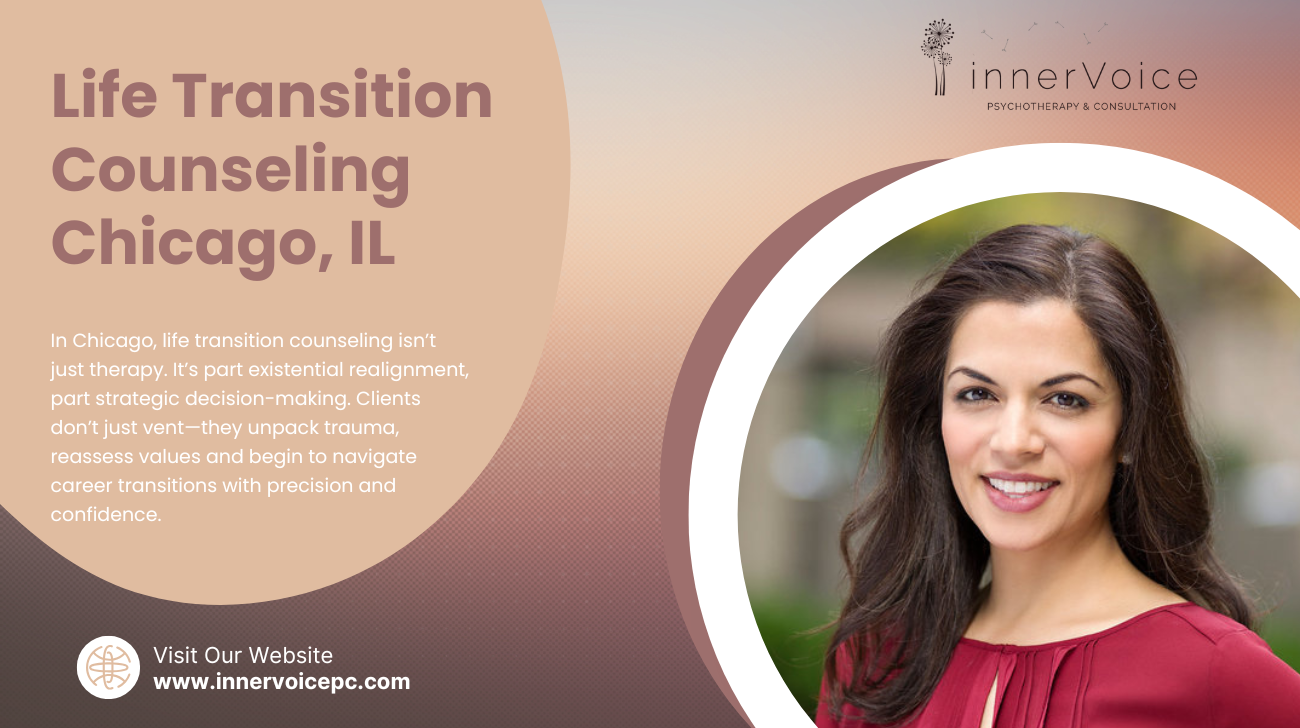
What Makes Chicago Unique for Life Coaching for Transitions
Big city pressure. Midwestern grit. Chicago isn’t just skyscrapers—it’s neighborhoods, family ties, and long winters that make change harder to handle. Life transition counseling in Chicago often blends the practical (like housing stress) with cultural sensitivities (family expectations, immigrant pressures).
Best Practices from Local Counselors
Chicago-based therapists often mix modalities—CBT, trauma-informed care, even somatic therapy—to address transitions from multiple angles. Whether it’s cultural adjustment counseling for newcomers or existential fulfillment support for aging adults, Windy City professionals understand the terrain.
Coping with Life Changes Beyond Work
Divorce Recovery Processes and Emotional Support
Divorce doesn’t end with the papers. It’s grieving, recalibrating, and sometimes parenting through chaos. Counselors guide clients through this phase, helping them build a new self—not just escape an old relationship.
Chronic Illness Adaptation & Counseling
When a diagnosis changes everything, even walking the dog can feel like a major life shift. Counselors specializing in chronic illness adaptation help clients adjust—not just physically, but emotionally and socially too.
Retirement Planning as a Life Shift
Retirement sounds dreamy until it feels directionless. Counselors help retirees create meaning beyond the job title, keeping isolation and loss of purpose at bay.
The Power of Trauma-Informed Transition Care
A Safe Space During Crisis
Life doesn’t always give a heads-up. Accidents. Job loss. Assault. In these moments, trauma-informed counseling ensures clients aren’t retraumatized by the process. Safety first. Then, healing.
Moving Through Trauma Without Getting Stuck
Not everyone wants to “talk about it” right away. Good counselors know when to pause, listen, or nudge. Transition care isn’t about timelines—it’s about letting people move at their own pace, with the right tools.
Support Systems That Make a Difference
Support Groups for Major Life Changes
Sometimes, you don’t want advice—you just want someone who gets it. Group counseling helps people realize they’re not alone in their confusion or grief. Whether it’s for job loss or gender transitions, community matters.
How Group Dynamics Help with Change Management for Individuals
Group settings create accountability, empathy, and normalization. They provide language for feelings and feedback for choices. And for many, they offer a sense of belonging during times of rupture.
Adapting to New Life Stages
Counseling for Life Transitions in Aging
Getting older isn’t just about wrinkles – it’s about relevance. Transition counseling helps aging individuals keep their dignity, purpose, and autonomy intact, even as bodies change and roles shift.
Gender Identity Transitions and Cultural Adjustment Counseling
Coming out. Transitioning. Moving countries. These shifts often happen together, or at least collide. Counselors who understand the intersection of gender identity and cultural displacement can offer life-saving validation and strategy.
When the World Doesn’t Feel Built for You
Whether it’s race, disability, or identity—some people face life transitions in a world that wasn’t designed with them in mind. Culturally competent counselors understand this and work to dismantle internalized shame and external barriers.
The Existential Angle
Seeking Fulfillment in a Season of Change
Sometimes people aren’t in crisis—they’re just empty. Counselors help clients name that void, explore where meaning has faded, and where it might be found again. It’s not always dramatic, but it’s deeply personal.
What Comes After Clarity
Even when someone figures it out—“I want to teach,” “I want to move,” “I’m ready to come out”—the next step can still be terrifying. Counseling provides structure after the insight, not just before it.
Choosing the Right Counselor
What to Look for in Transition-Focused Professionals
Credentials matter—but so does chemistry. Clients should seek someone trained in life transitions, yes, but also someone they feel seen by. Look for words like “trauma-informed,” “LGBTQ+ affirming,” or “career transition specialist” in bios.
Questions to Ask Before You Commit
-
What’s your approach to life changes?
-
How do you handle grief in transitions?
-
Have you worked with people in my situation?
These questions matter more than price or popularity.
Final Thoughts on Finding Direction Again
Life’s shifts aren’t always optional, but how someone moves through them is. Life Transitions Counseling isn’t just a luxury—it’s a stabilizing force during the storms of reinvention. For those standing at the edge of “What now?” A licensed professional counselor can help the next step feel less like a cliff—and more like a door.
FAQs About Life Transition Counseling
Q1: Is Life Transition Counseling only for big life changes like divorce or job loss?
Nope. It’s for any shift—big or small—that feels disorienting. Even positive changes like promotions or moving in with a partner can bring stress.
Q2: How long does transition counseling typically last?
There’s no one-size-fits-all. Some people need a few sessions; others may work with someone over several months, especially for layered changes.
Q3: Can this type of counseling be done online?
Absolutely. Many counselors offer remote sessions, which is especially helpful during relocations or when juggling busy schedules.
Q4: What if I already have a therapist—should I switch?
Not necessarily. Some clients choose to work with a transition counselor short-term, while continuing their therapy. It depends on your goals.
Q5: Is Life Transition Counseling covered by insurance?
Sometimes. If the counselor is licensed and the issue is diagnosed (e.g., anxiety), insurance may reimburse. Always check your policy first.